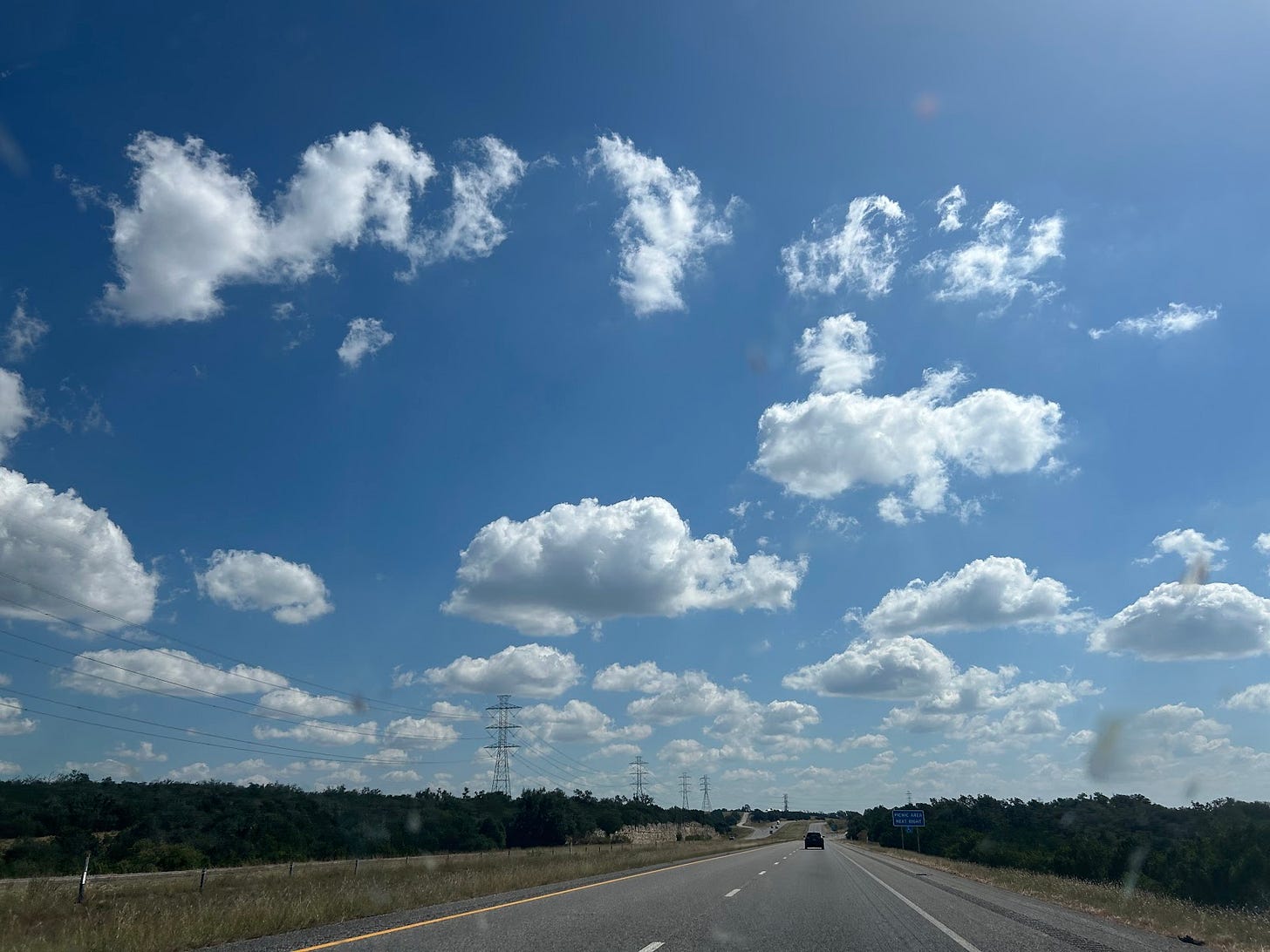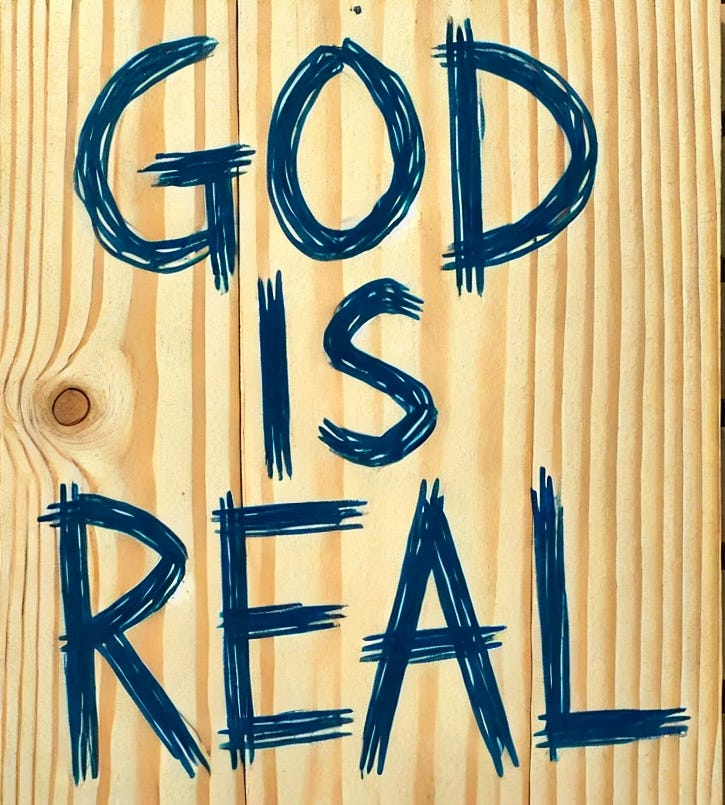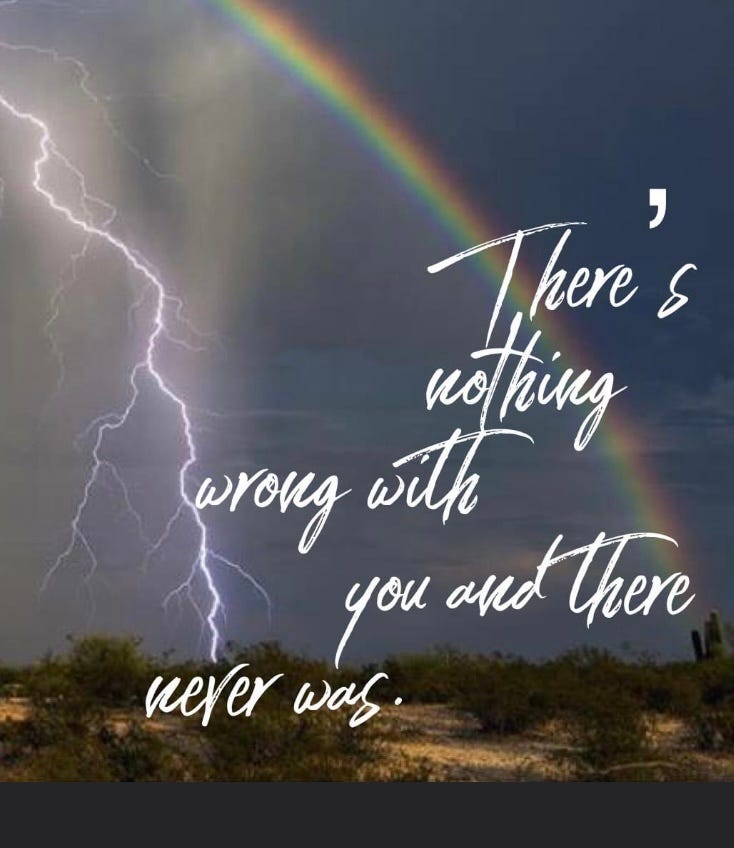Roadtrip
And your eyes turn towards the window pane To the lights upon the hill The distance seems so strange to you now And the dark room seems so still
This week’s essay begins in the now - where life always begins. I was reminded of this during a recent road trip to Arizona and Texas my husband and I took to visit adult children.
This stage of life is kind of scary. I turned 70 in June; Wayne was 74 in July.
In some ways, it feels like the end. Yet, deep in my soul, I know that with every ending comes a beginning. This final third of our lives, leading to our deaths, can’t truly be the end with nothing beyond it, can it? Think of life as a three-act play—after the third act, the curtain closes. The curtain is closing on the lives we've lived here on Earth, and regardless of what we believe about the afterlife, it all feels so final. As we step into this third act (our sixties marked the end of the second), unlike any other stage of life, we have no clear sense of what’s ahead. Before, there was always a far-off horizon, comfortably distant. But now, the horizon is rushing toward us, and it’s hard to imagine a future without one.
Our adult children are immersed in work, raising or launching children, making homes, social activism, their passions, survival, and thriving. They are busy in their lives, and it was hard not to notice the irony that once they wanted nothing more than our attention, but that’s now reversed. We have all the attention to give them now, but they are at stages where they don’t really need or even necessarily want it. I realized we kind of want their attention now, and I had to smile.
It’s not that we’re not fully immersed in our own lives and passions; we are. But we’re more available now that we’re older than when our children were small and needed us harder.
What we wouldn’t do, or so we think, to go back - knowing what we know in hindsight - and do it over.
And, of course, as I alluded to in my Oldster interview, there’s no going back or place for regret or do-overs. At this stage of life, it’s about completion, integrity, and acceptance. That’s what we’re learning. And upon reflection, it’s not their attention we need now; it’s the gift of giving them ours that gives us pleasure.
I’m grateful I got to participate in my young adult grandson’s graduation from nursing school; my daughter is incredibly busy with two jobs and his younger teenage triplet siblings. It brought me joy to order balloons and party decorations, get a cake, make dinner reservations, buy cards and gifts, and drive with my husband for two days to arrive in Texas and join the celebration.
On our way, we drove two more days and stopped in Tucson to visit another adult child in our blended family. We joined them briefly in Tucson's PRIDE celebration, though a 105-degree heatwave limited our plans. Most importantly, we finally got to see our daughter and her wife in their new home—our first visit since the pandemic kept them across the country in Maryland. In Arizona, where they recently moved, and Texas, it is a joy to see our adult kids in their daily environments, embracing life's challenges and living toward their dreams.
There was a sense of completion. We realized we were experiencing the empty nest syndrome, in a way, much later than the expected trajectory (we are both late bloomers) because our jobs as active, hands-on parents are done. The empty nest feeling lasted only as long as the entire road trip transpiring over about two weeks. Now that we’re home, we feel a truly sweet release to realize - because we realize it over and over - they are all grown and wholly themselves, and we are no longer central in their stories. That’s okay. We still play an important role; the word figurehead comes to me. I look it up:
fig·ure·head
/ˈfiɡyərˌ(h)ed/
noun
a carving, typically a bust or a full-length figure, set at the prow of an old-fashioned sailing ship.
a nominal leader or head without real power.
We have created memories and traditions, and now it’s their turn. What our children or grandchildren remember is an anchor going forward. The triplets will remember that time Nana and Papa took them camping when they were nine, how they ran up and down the rocks on the creek and put their feet in, how we found hot pools to soak in and shared snacks in the sun, roasting marshmallows over fire with the stars overhead; they’ll remember the campers’ next door kids sharing their bikes, fishing for trout, and hiking to glimpse the waterfall that once was, now covered over by a huge rockslide, then driving home, and bickering in the back seat, how Nana said listen to your heart instead of your head. What does your heart say?
That’s where God is, Hannah said.
But they will also remember the year we took them camping again at thirteen, and their iPhones didn’t work, and they couldn’t keep tabs on their friends and the creek and the hot pools, and even the water slide was so boring, mostly, but the s’mores were good; that was one thing. And their mom took them to a hot spot where they could check Snapchat and TikTok, another good thing, but they still missed their friends. All this, our grandchildren will remember, as their parents remember drinking from the hose, riding bikes until dark, no cell phones, watching cartoons on Saturday mornings, that one time their mom tried to trick them into eating liver by saying it was deer meat and they snuck it into the trash when she wasn’t looking, and eating Thanksgiving meal at their grandparents with all the aunts, uncles, and cousins, how they sat at the kids’ table. They can hardly believe the kids sitting at the grownup table at their aunts’ house a generation later, breaking the tradition. There will always be a kids’ table at our house, I promise. Always.
As a teenage mother, motherhood has defined my lifespan. But this is not what I wanted to write about this time. I have so many things running through my mind.
I still haven’t nailed down a publication for my essay about family scapegoating and estrangement, and in writing this, I am flummoxed by the juxtaposition of family dysfunction with family love and tradition.
We have each been married before; it is the third marriage for both of us. It’s been twenty-five years of marriage, August 7 this past summer, and twenty-eight years together. His daughter was ten when we met; mine were in their mid to late twenties when we married. My oldest grandson, age nine, was the best man at our wedding; his daughter, the maid of honor. Like I said, blended.
Someone commented on my Oldster interview: “Boomers gonna boom.” I’m not sure what they meant, but it felt insightful. Our parents stayed married, stayed religious, and upheld the traditions that we, as a generation, rebelled against. We were the anti-establishment youth of Woodstock, free love, flower power, peace, and communal living. Then, things fell apart. (And yes, that included sex, drugs, and rock ‘n’ roll.) We thought we had all the answers, didn’t we? Every generation tries to reinvent the world.
Boomers gonna boom.
Years ago, my parents came to meet Wayne after we had been together for a while and moved in together. Thinking we were doing them a favor, we sent them to a friend’s beach house. 'Here are the keys! Go! Visit the art museum,' we said. 'You can walk on the beach, have dinner, and enjoy a little vacation!' Karma is a bitch. They didn’t drive several states just to stay in some condo by the beach—they came to see us. Looking back, I can’t help but cringe. They weren’t on vacation. (Sorry, Mom and Dad.)
We are back from our road trip to see the kids. Days later, and I’m writing this.
We were just happy to see them.
On the long drive through Texas and New Mexico and back to Colorado, the road was a black ribbon, and the wind blew; a crop duster plane dipped low over the flat country, and we sat quiet, the radio off; semi-trucks rolled by, the hard sound of the wheels on fresh asphalt the soundtrack, the big sky endless and shifting. Wayne and I met by a pool in 1996, started talking about poetry, and haven’t stopped since; we sit as easily in silence. Long drives are our comfort zone.
We got to talking, as we do, about spiritual things. Life, death, and everything in between. I zoomed into my Conscious Contact Book Study in our hotel room Monday night. We had just started to read Joel Goldsmith’s “Practicing the Presence,” and I was telling Wayne how a few lines in the book had struck me. Goldsmith says the realization of the Invisible as the substance of all form is vital to the attaining of spiritual consciousness:
Every issue of life is determined, not by external conditions and things, but by our consciousness.
He explains that the value of any truth lies in the extent to which it is realized. I’m interested in how our consciousness expands and evolves. Is that a boomer thing? (It all started with LSD with us boomers, which recent generations have reinvented in the psychedelic medicine movement.) Goldsmith elaborates, “Truth realized is spiritual consciousness.”
It’s been my experience that whenever I’m struggling or in conflict, it’s not the situation or external circumstances that need to change—it’s my consciousness. I’ve learned that trying to figure it out intellectually doesn’t help. Only when truth arrives and is truly realized does the path forward reveal itself, like the parting of the Red Sea. Instead of things changing, I see things differently. Reading Goldsmith’s words on Monday night answered a question I didn’t even know I was asking:
With the horizon shortened and rushing toward us with all its finality , how will we manage what’s ahead?
We were deep in conversation about what it feels like to be in the so-called 'final act,' the last stage of life, discussing consciousness, God, or, as Goldsmith calls it, the Infinite Invisible. Wayne referred to it as physics, as seen in nature, and pointed out that there's a certain comfort in knowing that It knows what It’s doing, even if we don’t. I shared how those lines in the book reminded me that something greater than myself—by whatever name—has repeatedly revealed truths to me throughout my decades in recovery, and I trusted it would do so again. I was reminded that I would be led to a truth that, once realized, would shift my consciousness and guide me through—and in that moment, I knew that reminder was my answer.
Suddenly, out the window, in the middle of endless pastures as we drove through a remote corner of New Mexico—amid the tumbleweeds and fields and our conversation about truth, consciousness, and being guided—a homemade sign appeared on the side of the road, with hand-painted blue letters:
You had to be there. A wink from the universe, a beetle moment. Jung’s synchronicity.
Wayne suggested turning around for a photo, but it was too late. The horizon loomed, rushing toward us at 70 miles per hour, and we crossed the border into Colorado.
Almost home.
One thing:
Many of us are facing life transitions in this uncertain moment on the planet.
Reflect and Identify: Take time to reflect on the changes ahead. Write down what the transition means to you, what fears or uncertainties it brings, and what opportunities, as well as questions, arise.
Set Intentions: For example, in facing the last third of life and ending, I intend to rely on a greater power to guide me and to stay grounded in my awareness of and faith in the Infinite Invisible to carry me through this “last” passage. Truth realized is spiritual consciousness. I know my consciousness will be changed; I will see differently. What’s in the way of truth will be burned off.
Visualize the Transition: Picture yourself going through the transition successfully. This could involve meditation or journaling. Some spiritual traditions teach us to meditate on our deaths daily, which is helpful because life is an ongoing process of letting go until the last and final one, in which we return to the Invisible. And I do think it’s Infinite. Immerse yourself in nature. Trees know. All of life around us knows the wisdom of letting go; the cycle of life is everywhere.
Don’t quit. Of course, I struggle. I just don’t quit. God, or the Infinite Invisible, is the doer, the doing, and the deed, as well as the witness. When I remember that, I can relax and just be.
Humanity is facing a transition as a collective and we are in this together though we each must individually play the role we’re assigned. No one else can do it for us.
On repeat:
Shout outs:
Sharing a must-read from and shining light on her phenomenal newsletter Going Solo at the End of the World. Marya’s writing opens my chest and does some kind of voodoo magic, kind of like how in her essay The Before Times she describes her experience when she hears the right word or phrase:
There's such a joy to just the right word; a piece snaps into place.
The Before Times made chills go up and down my spine. I kinda peed my pants a little. Please read it. Read everything she writes. Subscribe. Marya is out there doing what we desperately need storytellers to do, carrying words through time and over roads and back to us so we can gather round and hold hands and listen to each other. This is a brave brave thing she does - bringing us each other.
And to draw us near
And bind us tight
All your children here
In their rags of light
~ Leonard Cohen












Thanks for putting into words what I have been so intently feeling since recently turning 70. 🙏🏻
I have re-read this essay twice, and cried at the end both times. Thank you, Kelly. For more than writing this. Thank you for being IN your life. That you take the time to report back with such art, insight, and eloquence is the kind of generosity that is a celebration of all of whatever it is we are doing here. I'm so grateful!